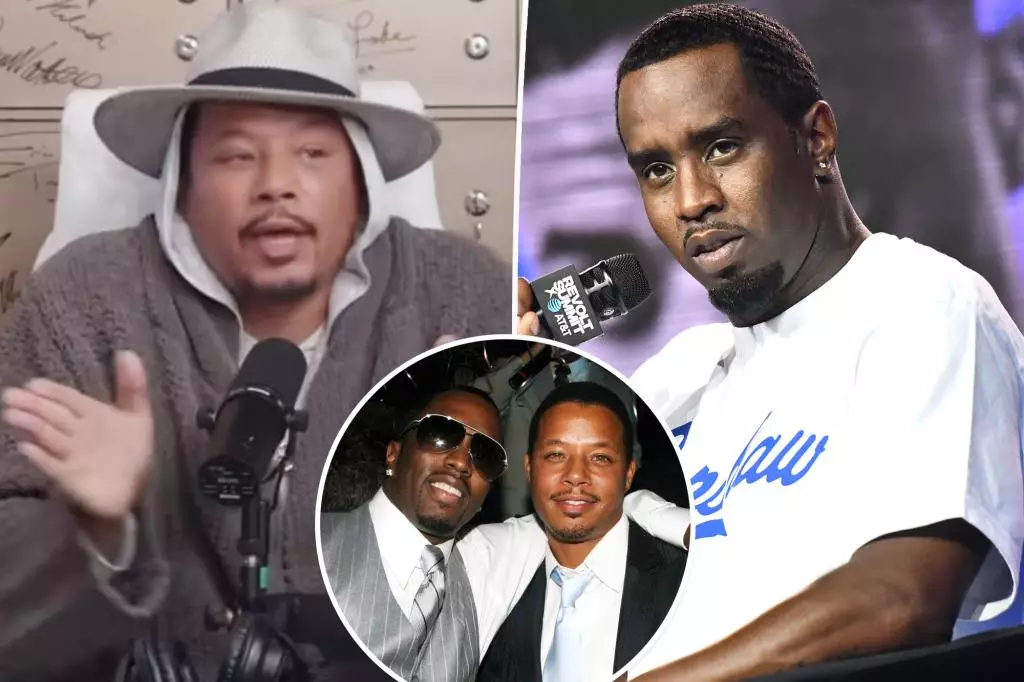In a recently aired episode of the “PBD Podcast,” actor Terrence Howard made stark allegations against Sean “Diddy” Combs, unveiling a troubling narrative that brings to light more than just casual interactions between two prominent figures in the entertainment industry. The 56-year-old actor, best known for his roles in films like “Hustle & Flow,” claims that Diddy, amid his ongoing legal troubles related to federal sex trafficking charges and sexual assault lawsuits, made inappropriate advances towards him. Howard’s recounting of events not only raises questions about Diddy’s behavior but also could spark a broader dialogue about the dynamics of power within Hollywood.
Pushing Boundaries and Crossed Lines
During their interactions, Howard describes Diddy as merely “sitting and looking,” creating an atmosphere that Howard found perplexing. Initiating contact as he sought to mentor Diddy in acting, Howard’s experiences quickly turned from professional to uncomfortable. Allegedly asked to play his music, the situation appeared to shift from artistic collaboration to something more personal, leaving Howard confused. His assistant’s stark commentary—that Diddy might be harboring ulterior motives—prompted Howard to sever ties, highlighting the complexity of personal and professional boundaries in an industry rife with power dynamics.
Howard’s vivid detailing of his discomfort serves to illustrate a larger issue—what happens when respect for artistry morphs into predatory behavior. The entertainment industry has long had its share of scandals involving powerful figures and their coercive activities, often hidden beneath layers of glamour and fame. Yet, Howard’s refusal to tolerate such advances serves as a warning signal. It reflects not only his personal principles but also a drive towards accountability that many now demand within the industry.
The Fragile Facade of Masculinity
While recounting his experiences with Diddy, Howard placed a significant emphasis on masculinity, declaring, “the man card means everything.” This perspective opens a dialogue about how societal notions of masculinity can influence interactions and impact relationships in environments like Hollywood. His declarations convey a complicated interplay where being a “real man” is intertwined with rejecting roles that might challenge traditional masculinity—a notion that can inhibit honest conversations around consent, power, and sexual orientation.
In many ways, Howard’s violent imagery of “threatening to punch” producers who venture into inappropriate territory underscores his commitment to uphold his self-image. Yet it also exposes a grim reality: the lengths to which individuals may feel compelled to go to protect their integrity and self-worth. Howard’s experiences illustrate a profound struggle with bullying tactics masked as artistic mentorship, challenging us to scrutinize the culture surrounding gender dynamics in the industry.
The Wider Context: Diddy’s Legal Challenges
The timing of these allegations is significant, coinciding with Diddy facing serious legal challenges, including federal charges and multiple lawsuits alleging sexual misconduct. This context raises a critical question: how do these accusations fit into a larger pattern of behavior surrounding Diddy? While many celebrities have distanced themselves from him amid swirling rumors, Howard’s direct claims mark a notable departure from mere hearsay—highlighting a tangible act of alleged predation.
Diddy’s vehement denial of allegations—claiming they are merely attempts to garner attention—paints a picture of a man under siege. Yet, the consistent emergence of complaints from both renowned figures and ordinary individuals suggests a troubling narrative that cannot be overlooked. It raises alarms about whether the culture of silence and complicity will continue to protect those in power while allowing victims to suffer in anonymity.
Future Implications
Terrence Howard’s revelations do not exist in isolation; they are symptomatic of a greater reckoning within Hollywood. As more individuals feel emboldened to share their stories, it seems evident that the paradigm is shifting. With actors and musicians asserting their experiences, the industry could be on the brink of a new era where accountability takes precedence over individual ambitions.
Howard’s refusal to conform to expectations—whether they involve playing a role or succumbing to intimidation —positions him as a figure of resilience in a landscape often characterized by vulnerability. The gravity of his statements resonates beyond mere gossip; they serve as a clarion call for change. In an age where discussions about consent, power, and safety remain front and center, Howard’s accounts could inspire others to come forward, hitting at the core of a movement striving for truth and justice. The pressure is mounting, and as the landscape shifts, so too will the expectations we place on those who wield their influence and power within the entertainment industry.

